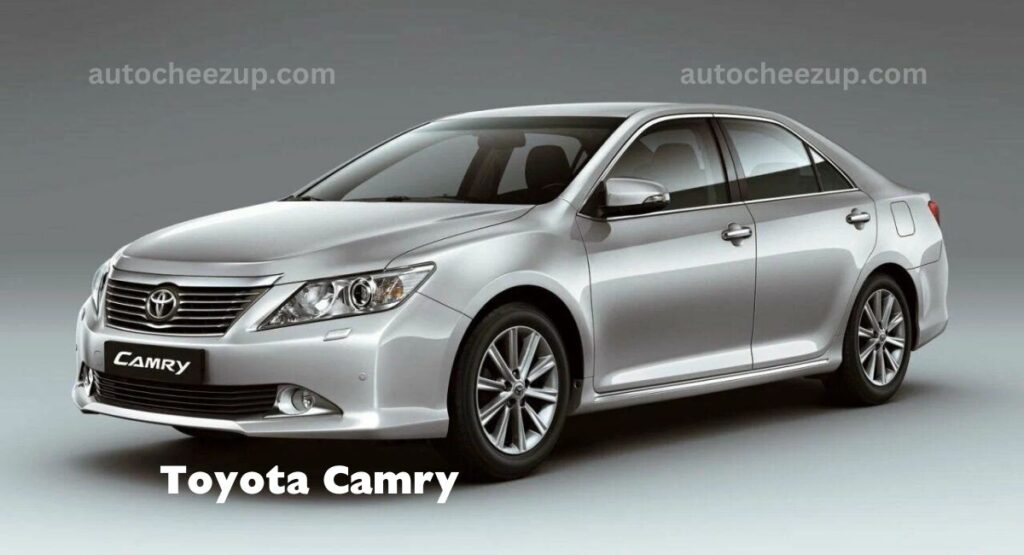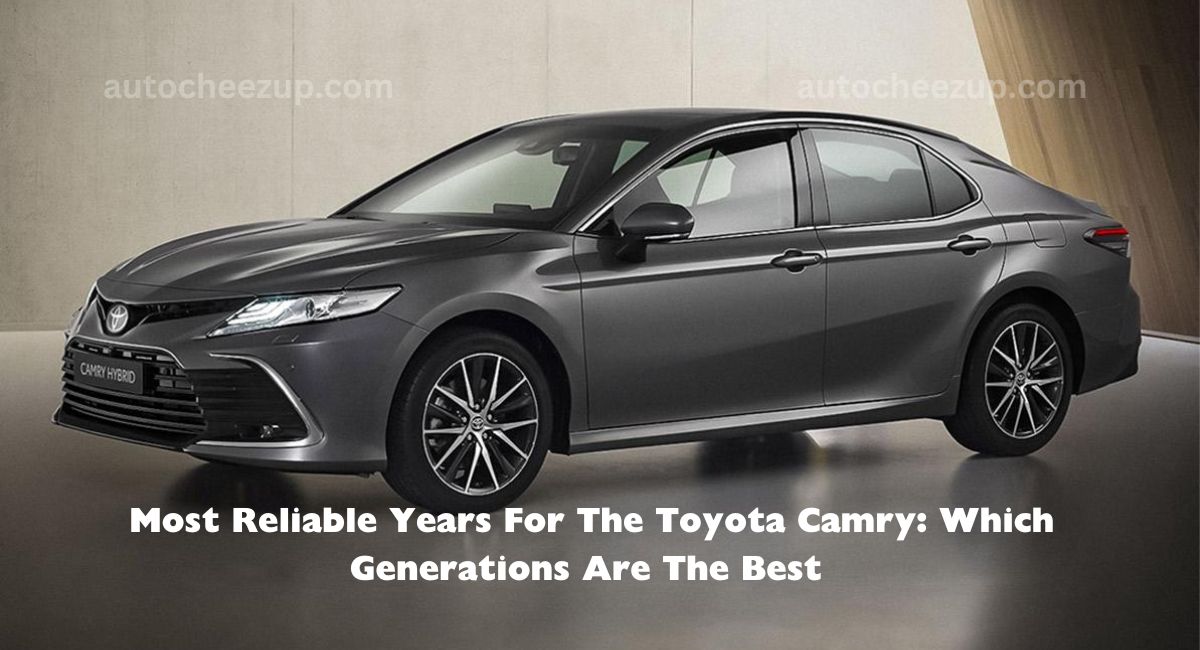The Toyota Camry has long been a symbol of reliability, comfort, and practicality. With decades of impressive performance and unmatched durability, it remains one of the most popular sedans worldwide. But which years and generations truly stand out as the most dependable?
If you’re searching for a used Toyota Camry, you’re likely wondering which models will give you the best bang for your buck. Not all Camry generations are created equal, and picking the right one can save you money on maintenance and repairs. So, how do you choose wisely?
From the mid-1990s to the latest models, the Toyota Camry has consistently earned high marks for reliability. Iconic years like the 2007-2011 models and newer hybrid options shine in dependability and fuel efficiency. Let’s dive into what makes these generations the best.
Toyota Camry: The Generations
| Generation | Years | Highlights | Reliability Rating |
| 1st Generation | 1982–1986 | Compact sedan with simple design and fuel efficiency, marking the Camry’s entry into the market. | Moderate |
| 2nd Generation | 1987–1991 | Improved build quality, more spacious interior, and introduction of all-wheel drive in some models. | Good |
| 3rd Generation | 1992–1996 | Larger body, refined styling, and increased focus on comfort and performance. | Very Good |
| 4th Generation | 1997–2001 | Known for bulletproof reliability and advanced safety features for its time. | Excellent |
| 5th Generation | 2002–2006 | Enhanced fuel efficiency, smooth ride quality, and the introduction of the Camry Hybrid. | Excellent |
| 6th Generation | 2007–2011 | Modern styling, superior reliability, and high resale value; a favorite among used car buyers. | Outstanding |
| 7th Generation | 2012–2017 | Redesigned interior, better tech features, and improved fuel economy across models. | Very Good |
| 8th Generation | 2018–Present | Sleek design, advanced safety features, and a perfect blend of performance and comfort. | Outstanding |
Fourth-Generation Toyota Camry: 1997-2001

The fourth-generation Toyota Camry, produced between 1997 and 2001, is widely praised for its dependability and practicality. This model introduced a sleeker design, improved interior space, and advanced safety features like optional side airbags, appealing to families and commuters alike. It also offered smooth handling and a well-balanced ride that made it a trusted companion on the road.
While its performance wasn’t groundbreaking, the fourth-generation Camry excelled in reliability, making it a favorite among used car buyers even today. The engines were durable and efficient, and its minimal maintenance requirements earned it a strong reputation. Though it lacked some of the modern features seen in newer models, it remains a solid choice for those seeking a budget-friendly, dependable vehicle.
Verdict: A Passing Grade
The 1997-2001 Camry delivers on Toyota’s promise of quality and reliability, making it an excellent used car option for its era. While it may not excite enthusiasts, its ability to handle daily demands with ease and longevity gives it a well-deserved passing grade. For those valuing practicality over flashiness, this generation remains a worthy contender.
Fifth-Generation Toyota Camry: 2002-2006
The fifth-generation Toyota Camry brought a fresh look and improved comfort, featuring a more spacious interior and enhanced ride quality. It marked the introduction of the first Camry Hybrid in 2006, highlighting Toyota’s commitment to fuel efficiency and environmental consciousness. Its reputation as a family-friendly sedan continued, thanks to its smooth handling and practicality.
However, this generation faced some challenges, particularly with engine issues in early models, such as oil sludge problems in the 2.4L 4-cylinder engines. While these problems were resolved in later years, buyers of used models from this generation need to ensure proper maintenance history to avoid costly repairs.
Verdict: Caution Advised
The 2002-2006 Camry offers plenty of perks, including comfort and hybrid options, but potential reliability concerns with earlier models warrant careful consideration. If you’re eyeing a fifth-generation Camry, prioritize vehicles with documented maintenance and lean toward models from the later years of this era.
Sixth-Generation Toyota Camry: 2007-2011
The sixth-generation Toyota Camry arrived with modern styling, improved technology, and a focus on comfort and fuel efficiency. This generation became popular for its smooth ride, spacious interior, and introduction of more advanced features, such as push-button start and navigation systems in higher trims. It also offered a reliable hybrid option, appealing to eco-conscious buyers.
However, this era of the Camry was plagued by significant issues, particularly with its 2.4L engine. Excessive oil consumption became a notorious problem, frustrating many owners with frequent top-offs and costly repairs. Some models also suffered from premature transmission failures, further tarnishing its reputation.
Verdict: Run Away As Fast As You Can
While the sixth-generation Camry may seem tempting due to its modern features, the widespread reliability issues make it a risky choice. Unless you’re prepared to handle expensive repairs, it’s best to steer clear of this generation and opt for a more dependable model.
Seventh-Generation Toyota Camry: 2012-2017
The seventh-generation Toyota Camry took a significant leap forward, blending modern styling with an emphasis on reliability and performance. Toyota refined its design, offering a quieter cabin, better fuel economy, and advanced tech features like Bluetooth connectivity and a user-friendly infotainment system. This generation catered to a wide audience, from daily commuters to small families.
This era of the Camry is often praised for its durability and reduced maintenance costs. Toyota addressed many of the issues found in previous models, particularly with engine and transmission reliability. Whether it’s the efficient 4-cylinder or the peppy V6, both options provided excellent performance and long-lasting quality.
Verdict: Winner, Winner, Chicken Dinner
The 2012-2017 Camry ticks all the boxes for a dependable, comfortable, and low-maintenance vehicle. With its modern upgrades and legendary Toyota reliability, this generation is a clear winner. If you’re searching for a used Camry, this is one of the best bets you can make!
Eighth-Generation Toyota Camry: 2018-Current
The eighth-generation Toyota Camry redefined the midsize sedan category with its bold design, sporty handling, and cutting-edge features. Built on Toyota’s New Global Architecture (TNGA) platform, it offers improved driving dynamics, a refined interior, and advanced safety systems like Toyota Safety Sense as standard. Hybrid variants also boast impressive fuel efficiency, making them a top choice for eco-conscious drivers.
Despite its innovations, some owners report issues with the 8-speed automatic transmission, including rough shifting and hesitation. While these problems aren’t widespread, they may affect the overall experience. Early models in this generation might also face software-related glitches in the infotainment system.
Verdict: Proceed With Caution
The 2018-current Camry combines modern aesthetics and reliable performance, but potential transmission quirks and tech issues warrant a closer inspection. If you’re considering this generation, prioritize newer models with updated systems and a thorough test drive to ensure a smooth ride.
Frequently Asked Questions
Which generation of the Toyota Camry is the best?
The seventh-generation Camry (2012–2017) is often considered the best due to its reliability, comfort, and modern features. It resolved issues from previous generations and is budget-friendly for maintenance. This makes it a top choice for used car buyers.
Are there any years of the Toyota Camry that should be avoided?
The sixth-generation Camry (2007–2011) is known for issues like excessive oil consumption and transmission failures. Early fifth-generation models (2002–2006) also had engine problems. These years require caution when buying used.
How does the Toyota Camry compare to other cars in its class?
The Toyota Camry stands out for its long-term reliability, resale value, and low maintenance costs. While rivals may offer more luxury or performance, the Camry’s practicality and durability make it a class leader.
Are older Toyota Camry models reliable?
Yes, older Camry models, especially from the fourth and fifth generations, are known for their durability. However, proper maintenance is key to ensuring continued reliability. Many older Camrys are still running strong today.
Are newer Toyota Camry models just as reliable as older ones?
Newer Camry models maintain Toyota’s reputation for reliability while offering modern tech and safety features. While there are some minor concerns, overall, they’re just as dependable as older models, if not more so.
What common issues should I be aware of in older Toyota Camry models?
Older Camrys may face issues like oil sludge (2002–2006 models), worn-out suspension parts, and failing transmissions (2007–2011 models). Checking maintenance records and getting a pre-purchase inspection is essential.
Wrap-Up: Which Generation of Toyota Camry Is the Most Reliable?
The seventh-generation Toyota Camry (2012–2017) takes the crown as the most reliable. It combines legendary Toyota durability with modern features and improved performance, addressing past issues seen in earlier generations. If you’re seeking a dependable, low-maintenance sedan, this generation is the ultimate winner.
